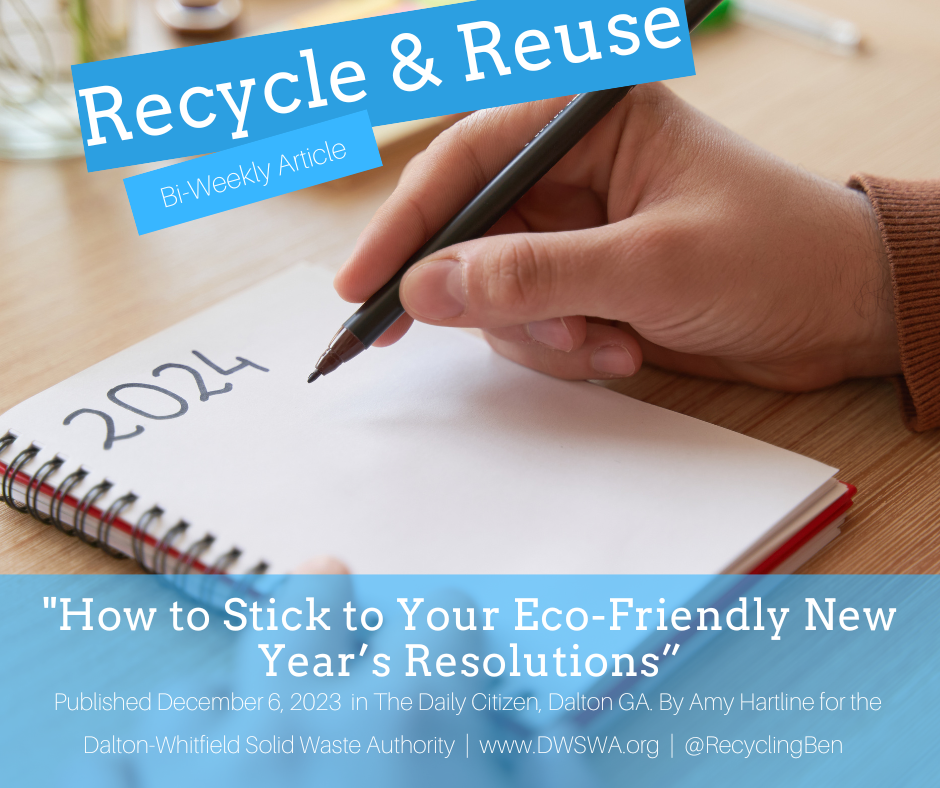Making a More Eco-Friendly Workplace
/(Published on Wednesday, September 2, 2015, in The Daily Citizen newspaper, Dalton, GA.)
Recycle & Reuse: Making a More Eco-Friendly Workplace
A reusable mug for tea and coffee can replaces hundreds of disposable cups reducing the amount of trash generated at your business.
You may have heard of large corporations having a sustainability plan, zero waste goals, or even recycling rates that are at 100%. All of these eco-friendly practices are ways businesses can have a positive impact on the planet, use fewer natural resources, reduce their carbon footprint and in some cases save money on operating costs. You don’t have to be part of a large company to reap the benefits of eco-friendly practices in the workplace. Here are some tips that small and large businesses alike can implement to create more eco-friendly workplaces.
An easy place to start is saving energy by turning off the lights in rooms that are not in use and at the end of the day when staff goes home. Motion detector or motion sensing light switches can be installed in bathrooms and offices so that lights can turn off automatically after a few minutes. These items may also be called vacancy sensors or motion sensor wall switches and are available at hardware stores or online. There are many models available so be sure to choose those with appropriate wattage and range for your site.
Another way to save energy is to power down and unplug electronic devices when not in use and at the end of the day. This can include computers, printers, copy machines, and microwaves. Most of these products stay in standby mode, which means they still require energy when not in use becoming ‘energy vampires’. If you don’t want to completely shut down your computer you can use the energy saver settings to switch the computer to sleep mode or automatically shut down after a certain amount of time.
Adding plants to the office may not have a direct impact on the bottom line, however, you will help clean the indoor air and even improve the mood and productivity of employees. There are many indoor friendly plants that help remove volatile organic compounds or VOCs and other indoor air pollutants. These pollutants may come from copy machines, upholstery, synthetic cleaning materials, pollen, and outdoor air contaminants like car exhaust. NASA conducted a clean air study and determined which plants remove certain types of pollutants.
One of the plants identified was the garden mum, which removes ammonia, benzene, formaldehyde, and xylene from indoor air. Other plants that can help clean indoor air include the spider plant, peace lily, bamboo palm, snake plant or mother-in-law’s tongue, aloe vera and dracaena. As indoor houseplants, this group of plants thrives on indirect sunlight and low-maintenance.
Transportation is an area of the business where you can save money and reduce your carbon footprint. Encourage employees to carpool before and after work to reduce the number of cars on the road. Fewer cars mean less air pollution from carbon dioxide emissions and less money spent on fuel and car maintenance. Some employees may live close enough to the office to ride their bike to work. Support that healthy habit by providing a bike rack or allowing staff to store their bicycles indoors.
If your business has company cars available you can encourage staff to pre-plan trips to avoid unnecessary travel. For example, if the staff needs to buy supplies from the office supply store designate one person to make a list of supplies needed and go to the store only once a week. Having a designated day of the week for certain errands and requiring carpooling for off-site meetings can save fuel and reduce air pollution.
Offices with a conference room or break room with a coffee maker or water cooler most likely have disposable cups available for staff and guests. If you have twenty employees that drink coffee every day in a disposable cup by the end of the week you’ll end up with at least one hundred cups to throw away. The environmentally friendly alternative, in this case, is to allow the use of reusable mugs and cups. A reusable coffee mug can replace hundreds of disposables and last for years.
Implementing the use of reusable mugs, cups, plates, cutlery, and even napkins can dramatically reduce the amount of trash you generate potentially reducing your garbage hauling fee. Encourage employees to bring their own mugs, reusable water bottles or tumblers and provide the supplies needed for the containers to be washed while at work. You could even purchase custom mugs with the company logo for a more uniform look.
Recycling is another way to be more eco-friendly at work. Paper is still the most recycled product in an office setting despite efforts to go paperless. To implement a recycling program at work visit Recycling at Work, an initiative from Keep America Beautiful online at www.recyclingatwork.org. There you’ll find tools and action plans that guide you thru doing research, setting up a collection method, promoting recycling at work and recognizing employees who recycle. When you recycle you reduce the amount of trash you make and help conserve natural resources need to make new products.
Liz Swafford is the Recycling and Education Program Coordinator for the Dalton-Whitfield Solid Waste Authority. Learn more about recycling in Whitfield County by visiting www.DWSWA.org or call 706-278-5001.
































